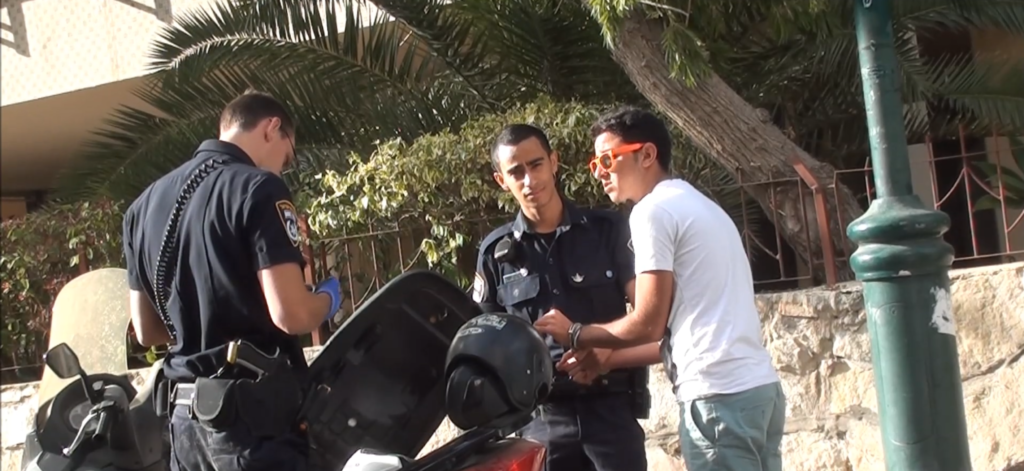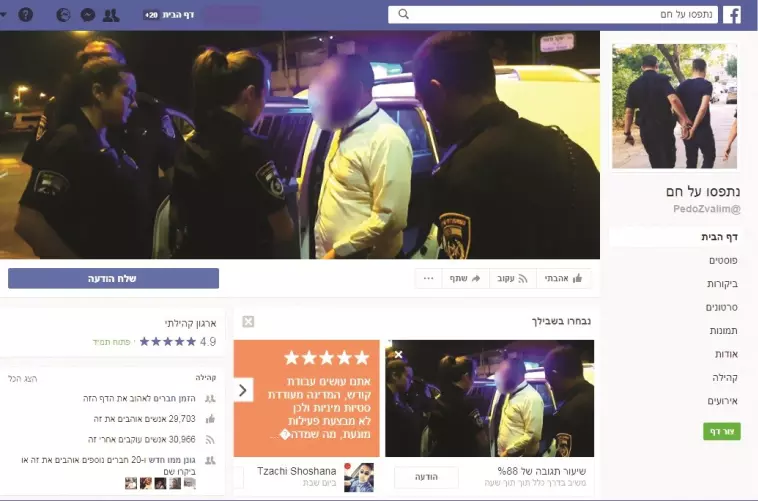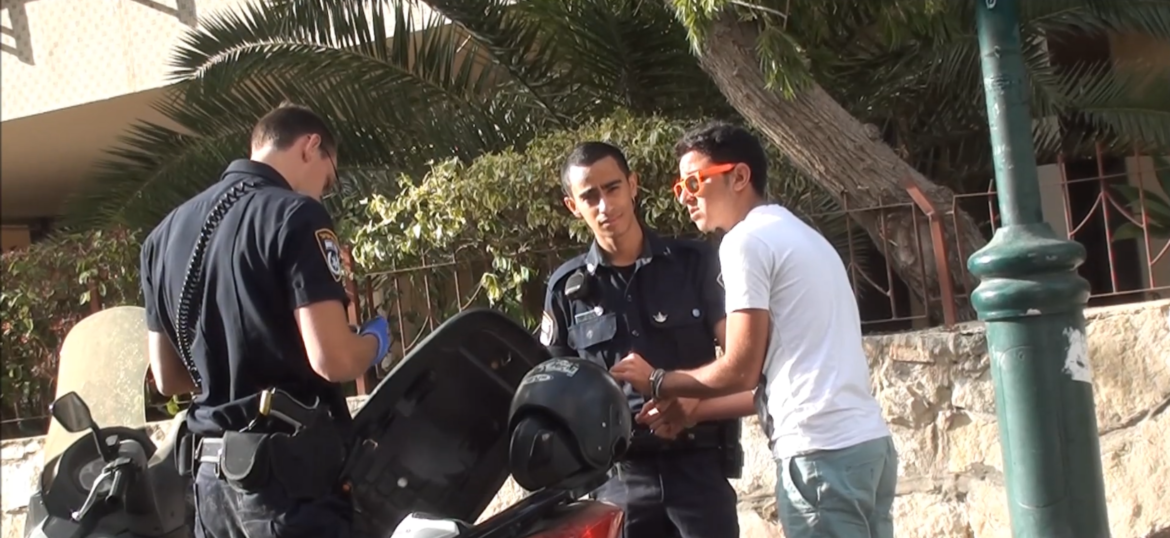The arrest of the pedophile network once again raised the debate about the need for a public database where the names of convicted sex offenders living among us will be published. Opponents believe that “criminals will not be able to rehabilitate.” Avi Dubitzky says its necessary to protect children.

The police took a vital action yesterday, and they need to persevere and invest their entire workforce in it,” says Vared Vindman, CEO of the Child Safety Council, following the announcements of the arrest of 22 pedophilia suspects online. “The question is how many people do these monitoring actions and maybe it’s worth letting volunteers monitor according to the required rules so that a legal and criminal case can be conducted against those people.”
According to the reports, the suspects were arrested in a police operation at the end of three months of an undercover investigation. Most of the arrested suspects have no criminal record, and it was noted that they are engaged in various occupations. It was also announced that for the investigation, the police activated a police agent who impersonated a 13-year-old girl in chats and on social networks. The capture of pedophile networks, like the one yesterday, once again raises the demand to open a public database of convicted pedophiles that will allow the public to check if anyone living near their place of residence might harm his children.
The question of whether to provide information about a sex offender who served his sentence and returned to live in the community also occupied the members of the Knesset. Back in the 17th Knesset, former MK Eli Afalo (Kadima) tried to establish a database on pedophiles. In addition, he proposed that sex offenders receive drug treatment to prevent sexual urges. However, this proposal was not approved. About six months ago, MK Oded Forer submitted (Israel Beitenu) A similar proposal, according to which the director of the courts will manage the information in the database and be open to public inspection. In the database will appear the names of criminals who have been convicted of pedophilia, except for those who are being treated with medication and those who have been convicted once, and seven years have passed since that conviction. The proposal was discussed in the Committee of Ministers but postponed the debate.
According to MK Porer, he was required to draft the law after an application reached him. “I was told about a kindergarten where one of the fathers is a convicted pedophile,” he says. “There is a place to establish such a database, and I hope a legislative process will begin.”

According to a report compiled by the Knesset in 2010, it appears that every year an average of 100 offenders are convicted of sexual offenses against minors under the age of 13, when there is no family relationship between them and the victim or the relationship between them is unknown. In this regard, it is appropriate to make a distinction between pedophilia, a psychological-sexual disorder that means sexual attraction to children, and a sex offender who sexually exploits children and is not necessarily a pedophile.
According to the law, the Tsur unit of the prison service is supposed to monitor sex offenders, including pedophiles, who have been released from prison and have been defined as having a medium or higher level of danger. As of the end of 2015, their number was 1,049 people. The conditions of supervision are determined according to the type of offense for which the sex offender was convicted and include removal from places where children are, and even a ban on the use of mobile phones or computers. The supervision order is valid for up to five years.
“After this period of time, the supervision is over and that’s it, they can do whatever they want,” clarifies Eliran Melki, journalist and owner of the blog “Proctoblog”, which publishes a database of names and photos of convicted pedophiles. “Pedophilia is a mental illness that has no cure, you cannot take a pill and cure it. Chemical castration is proposed as a solution, but there are not enough studies on its effectiveness, and even if it reduces the risk, the State of Israel is not willing to finance the treatment.”
In the absence of a public database that indicates the pedophiles living among us, several initiatives of private individuals such as Malki were born. According to him, when news is published about the arrests of pedophilia suspects, the number of visits to his blog increases significantly. “People are under pressure,” he says. “It’s sad and miserable that you don’t know if the neighbor across the street is a pedophile and you’ll never know, because the state doesn’t want you to know. It takes the ‘it’ll be fine’ approach, and that’s the scariest.”
The “Let them grow quietly” website also offers information to the public about freed pedophiles. As with Malki’s website, the database is built on information collected from letters of indictment and published judgments. On the “caught red-handed” Facebook page, on the other hand, they took the matter one step further. “Due to the refusal of government bodies to expose pedophiles, we decided to take it into our own hands,” the Facebook page reads. The group, headed by Avi Dubitzky, who defines himself as a “pedophile hunter”, corresponds with sex offenders on the Internet and arranges a meeting, which is also joined by police officers and a camera. He uploads the arrest documentation to the Facebook page.
“I’m not doing anything that is legally prohibited,” Malki clarifies. “I took those who were convicted, and there are another 400 people whose status I am not 100% sure of and where the indictment stands. In addition, if I do not have a picture of the perpetrator, I will not publish just his name to avoid confusion.”

I have heard two main arguments for this. The first claims the right to privacy: if I committed a crime and paid my debt to society while in prison, it is impossible to continue persecuting the criminal for life. But a pedophile is sick with a disease, and sitting in prison did not cure his illness. He needs to be watched over and, at the same time, warned The public is against him. The second argument is that if the names of the perpetrators are exposed, people will harass and beat them. In my opinion, this is nothing more than the state’s evasion. What is better? That some idiots beat the pedophile or that he continues to rape children, ruin their lives and change their world entirely to the end?”.
And there are other claims against revealing the names of the convicted pedophiles. “These people need treatment,” says attorney Noga Wiesel, an expert in representing suspects in sexual offenses. Why destroy them? The state’s goal is for them not to commit these offenses again.”
And what about the parents who fear that their children are in the vicinity of someone who has already committed a crime and, according to all the studies, is about to save it again?
“You can’t execute them, right? And you can’t put them in cages after they’ve served their sentence. If so, the goal is for them not to offend again. But it’s the state’s responsibility to ensure that they are treated so they don’t go in and out of prisons. If a criminal offends Again, a sign that he was not treated properly.”
on the safe side
Around the world, the question of publishing the name of pedophiles is treated differently. In the United States, for example, there is a public database where everyone can check which sex offenders live in the radius closest to their home. According to the law, the offenders’ names, physical descriptions, addresses, the nature of their offense, and a link to their probation officer are published on the website.
In the UK, those convicted of serious sexual offenses must register on the sex offenders and violent offenders register. The law authorizes the court to impose an obligation to provide details also on the parents of minor sex offenders. Also, the police can provide information about sex offenders to specific groups of people, including those who work with children, employers, and homeowners.
The legislation in Canada does not regulate reporting to the community. Yet, in some provinces, the police allow information to be given to the public about the release of sex offenders who are defined as dangerous to the people using a public announcement through the media, which includes the name of the offender, his picture, and additional information about him. And what do those who trust the welfare of the children say? Surprisingly, the Council for the Peace of the Child opposes establishing a public database. “The State of Israel has an important and good system of protecting children from convicted sex offenders,” says Vindman from the Council for Child Peace. “Experience from around the world shows that as soon as there was an open database, the criminals felt persecuted and went underground, changed identities and places of residence, and it was impossible to monitor them. Their dangerousness increased, and thus the company’s salary was at a loss.”
So what is the solution? How will we protect the children?
“In this context, several things must be done: the supervision must be airtight with maximum personnel, and the existing legislation must be expanded. We previously called for a bill that says that even if the danger is not the highest, one must supervise for longer than the law stipulates. If the person is not rehabilitated and poses a danger to the children, he should be supervised. This is the state’s responsibility not only toward the criminals but also towards the potential victims. At the same time that the state should do proactive operations, the parents should not be ashamed and ask the school and the operators of the classes if they have requested a certificate from the police regarding the people who work with the children to be on the safe side.”
Only Evil people that hurt children find themselves in from of a Judge in Israel. These people have uncontrollable urges, and sending them to prison is like giving an aspirin to a cancer patient. It temporarily alleviates the pain that is bound to come back. When they get out, they are no different, they still have the same urges, and if these are not controlled, they will soon hurt more children. So these children become the unsuspecting targets of these people, and the parents haven’t the slightest clue who they are and where they might strike again. The Government has all these twisted theories that they won’t be able to assimilate into society and lead an everyday life after they pay for their crimes. This is not like stealing from the bank; this is a severe illness deeply embedded in these people’s brains that children are legitimate prey. You can’t control that by the threat of jail time. I suggest the ministers stop being selfish and consider all the poor children that could be saved with proper legislation.


